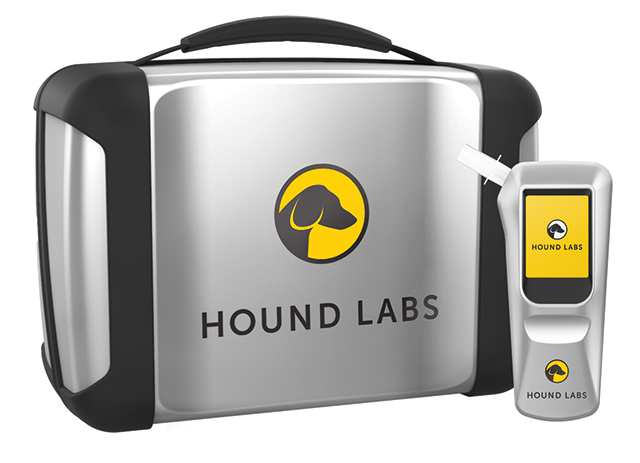Since the recent legalization of marijuana, it’s been easier than ever roll up a joint and get high with some friends. But the growing cultural and systemic acceptance of pot smoking doesn’t mean the rules of the road are any less lax; it’s just that enforcing them has been complicated.
Unlike alcohol intoxication, which can be measured in blood alcohol content, the presence of marijuana in a driver’s system doesn’t necessarily indicate that they’re not OK to drive. But an Oakland-based company may have figured out a way to clear things up for law enforcement trying to police stoned driving.
Founded in 2014, Hound Labs created the first pot breathalyzer, which the company says can accurately detect whether a person consumed the drug within the past two hours—the peak time frame for intoxication.
The breathalyzer then displays results within minutes. Hound Labs co-founders Mike Lynn, a doctor and reserve deputy sheriff, Jenny Lynn, an entrepreneur, and Kuni Oh, a patent attorney, say their invention pulls double duty by measuring alcohol impairment as well. “We are trying to make the establishment of impairment around marijuana rational and to balance fairness and safety,” CEO Mike Lynn explained to NPR.
Currently, law enforcement in California and throughout the U.S. rely on field sobriety tests or simple observation to catch signs of marijuana use. But stoned drivers could often avoid detection by popping a breath mint.
Officials say driving under the influence of cannabis is getting worse. According to a 2014 survey by the U.S. Department of Transportation, nearly a quarter of drivers tested positive for at least one drug that impedes safe driving—a concerning increase from the years prior.
Though there’s still some debate about what THC levels in a person’s breath, blood or saliva cause functional impairment, several states that have legalized the drug also set their legal guidelines for driving while high. In Colorado, Illinois, Montana and Washington state, motorists with a THC blood concentration of 5 nanograms or more are considered too high to get behind the wheel, according to the National Conference of State Legislatures. In Nevada and Ohio, the statute sets the threshold at 2 nanograms.
Hound Labs plans to roll out a series of pilot programs with police departments this fall to test the new breathalyzer. That said, better to stay safe than sorry. Bum a ride from a friend or do what any responsible person would do and call a Lyft.



